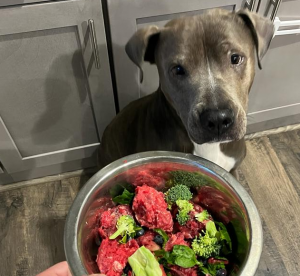The Impact of Diet on Dog Allergies: What You Need to Know
It’s that time of year again. The sun is shining, the birds are chirping, plants are blooming, and the dog is scratching his brains out of his head. For everyone whose household is plagued by pet allergies, you know what I’m talking about. Atopic dermatitis or environmental allergies are a lifetime ailment, with onset typically occurring in early adulthood.
So how do we help our pets with allergy woes?
Consult Your Veterinarian
Absolutely include your veterinarian in the discussion. They can help manage signs of atopic dermatitis, treat any potential secondary skin or ear infection brought on by all the scratching, and provide long-term solutions. Some pets do require medication assistance, ranging from a daily OTC antihistamine to a monthly injection administered by your DVM.
Make Changes at Home
There are also some changes you can make at home to help make an impact on your pets’ allergies and support the medical plan you have laid out with your veterinary team. Stay up to date on changing the air filters in your home HVAC, assess your vacuum cleaner’s effectiveness, and contemplate adding an air purifier. Reducing allergens indoors that your pet is exposed to most often can be significant in increasing their comfort during peak allergy months- even small changes like wiping their feet off when they come back indoors to capture some allergens they are carrying inside can help! I personally felt a difference in my own springtime allergies when adjusting my cleaning routine around my dog’s seasonal allergies, so bonus win for me and my Dyson.
Consider a Minimally Processed Diet
Diet can also play a factor here! Just like diet can impact overall human health, the food we feed our pets can drive their overall health. Traditional pet food diets, like kibble and canned foods, are highly processed. Through that processing, those diets contain higher concentrations of advanced glycation (AGEs) and advanced lipid peroxidation end products, which are referred to collectively as cooking toxins. In fact, dogs may ingest up to 122 times more cooking toxins from their kibble throughout their lifetime than humans eating a typical ‘western’ diet like we consume here in the USA. Cooking toxins are harmful to the body and can contribute towards systemic inflammation, gut microbiome toxicity, structural changes to body tissues (ex. stiffening of collagen), and other damaging body processes.

Raw foods, because they do not utilize heat processing, also contain functional bioactive compounds that are heat sensitive and would typically be destroyed during heat processing.
Minimally processed diets, which include raw and gently cooked food categories, however, have a variety of positive effects on general health. Minimally processed foods are higher in antioxidants and are low in or void of damaging cooking toxins. Raw foods, because they do not utilize heat processing, also contain functional bioactive compounds that are heat sensitive and would typically be destroyed during heat processing.
But how do minimally processed diets potentially make an impact on my pets’ allergies?
Atopic dermatitis is an inflammatory skin disease that is brought on by an immune response to an allergen in the pets’ environment. We also know 70% of the body’s immune cells reside in the gut. To best support the pet and their immune system, we need to factor gut or digestive health into the equation, which brings us back to the food we feed our pets matters.
Minimally processed and raw diets are a great option for these pets. Raw diets in particular have a different macronutrient profile that encourages the growth of a different microbial population than you may see which ultra-processed diets like kibble.
What about research?
There is published research supporting these concepts in greater detail. DogRisk Research Group published a paper on Canine Atopic Dermatitis in 2020 which reviewed data from over 2200 dogs. Their findings included some interesting connections between the diet of young puppies and their likelihood to develop environmental allergies later in life, including that puppies 0-8 weeks of age fed a raw diet had a decreased chance of developing atopy later in life.
The same research group has published several additional papers expanding on their findings on the dietary impact of common canine ailments such as canine atopic dermatitis/environmental allergies, inflammatory bowel disease/chronic enteropathy, and mobility issues/hip dysplasia.
There is also an interesting growing area of study supporting that raw diets have an anti-inflammatory effect. Anderson et al 2018 findings included raw diets inhibited the expression of pro-inflammatory cytokines while the kibble diet induced the expression of pro-inflammatory cytokines in dogs in their study. Puurunen et al 2022 findings similarly showed that kibble-fed dogs had higher levels of inflammatory markers than the raw-fed dogs included in their study.
How do I find a safe minimally processed or raw diet for my pets?
This is easier than you think! If you’re looking for commercial raw food, check out Instinct. Their diets are complete & balanced, free of pathogens, and formulated by small animal nutrition experts. Their Raw Longevity diets are also designed to provide life stage-specific nutrition while supporting key body systems- including gut and immune health.
Chat with the team at Northpoint Pets for more information on other minimally processed options in-store!
*This article is for informational purposes only. It is not meant to provide medical advice or replace the advice of a qualified veterinarian.






